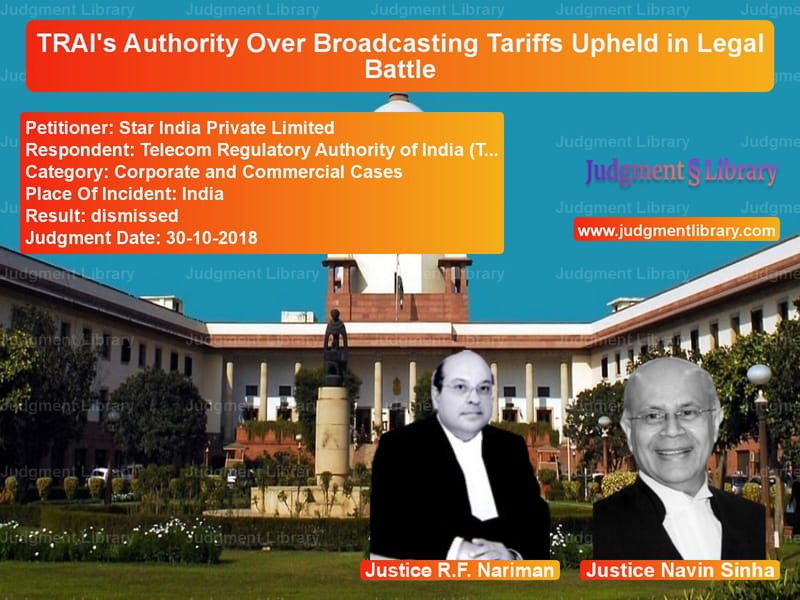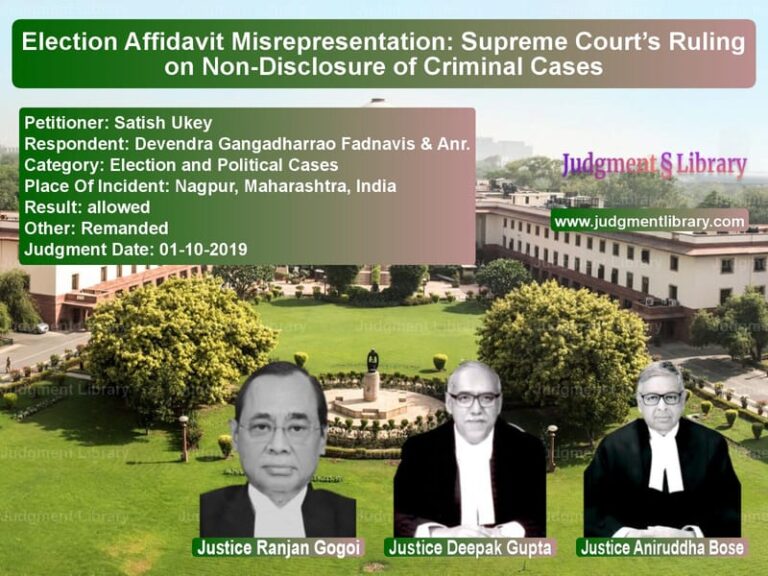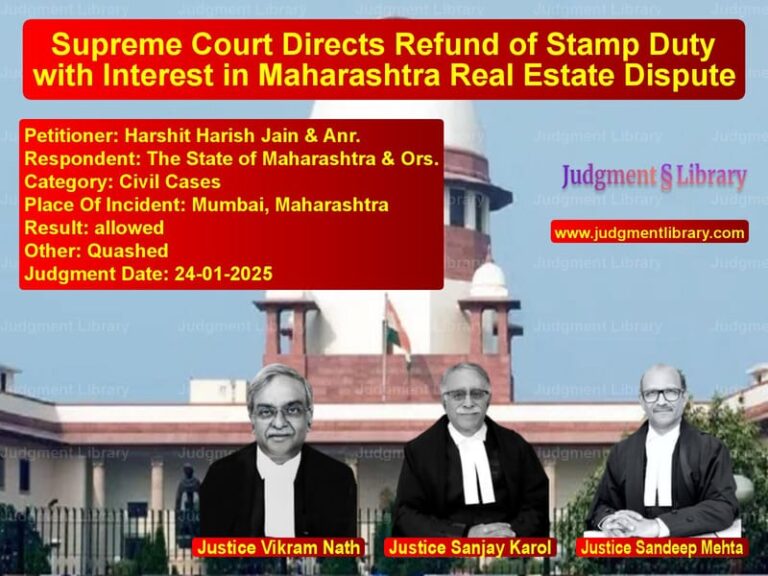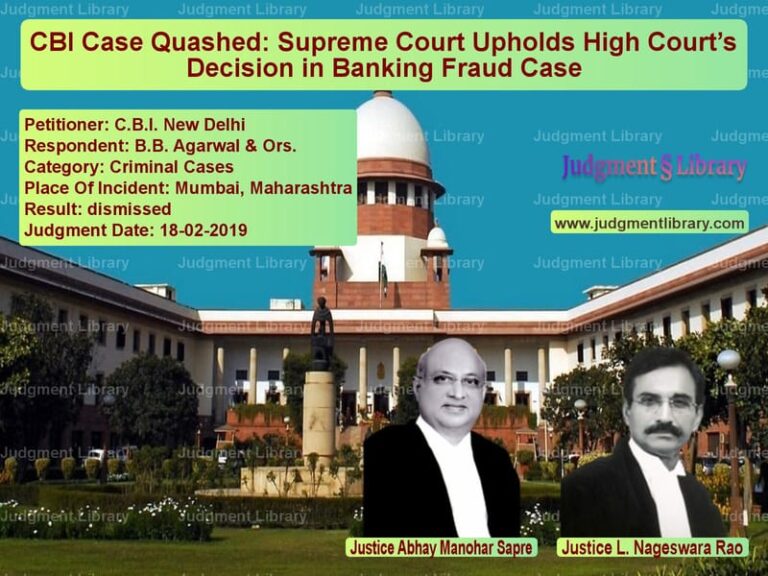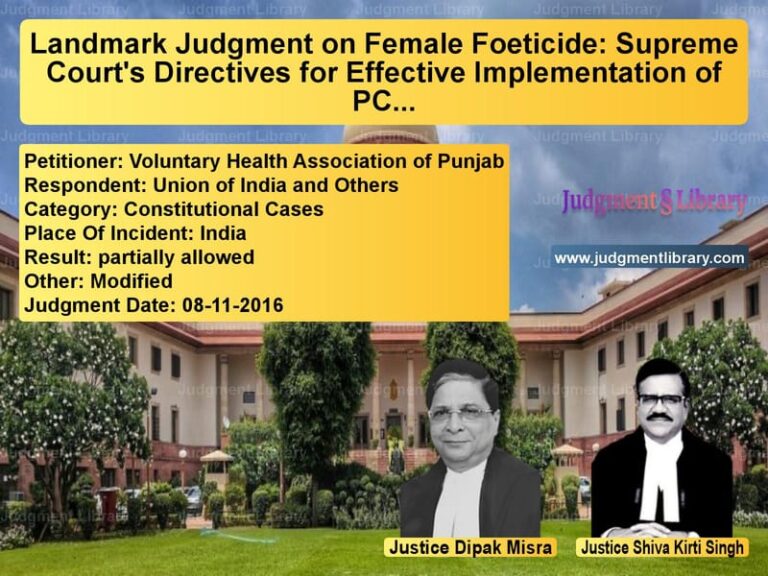TRAI’s Authority Over Broadcasting Tariffs Upheld in Legal Battle
The Supreme Court of India recently ruled on a significant dispute between Star India Private Limited and the Telecom Regulatory Authority of India (TRAI). The case revolved around the regulatory authority’s power to control television channel tariffs and bundling practices in the broadcasting sector. The judgment reaffirmed TRAI’s authority to regulate pricing and channel distribution while balancing consumer rights with business interests.
Background of the Case
Star India Private Limited, one of India’s leading broadcasters, challenged specific provisions of the Telecommunication (Broadcasting and Cable) Services Interconnection Regulations, 2017 and the Telecommunication (Broadcasting and Cable) Services (Eighth) (Addressable Systems) Tariff Order, 2017. These regulations were issued under the Telecom Regulatory Authority of India Act, 1997.
The primary contention was whether TRAI had the legal authority to regulate broadcasters’ pricing models, discounting policies, and channel bundling. The case had significant implications for the media industry, affecting pricing strategies, content distribution, and consumer accessibility.
Key Issues Raised
- Did TRAI have the authority to regulate television channel pricing and bundling?
- Did the regulations infringe upon the Copyright Act, 1957, which governs content ownership?
- Were the price restrictions and bundling limitations imposed by TRAI justified in protecting consumer interests?
- Should broadcasters have complete freedom to determine their own pricing models?
Arguments of the Petitioner (Star India Private Limited)
- TRAI was attempting to regulate an area beyond its legal jurisdiction. The TRAI Act was meant to regulate transmission, not content pricing.
- The restrictions on discounting and bundling of channels imposed by TRAI interfered with the business decisions of broadcasters.
- The Copyright Act, 1957, granted broadcasters exclusive rights over their content. By capping prices and regulating distribution methods, TRAI was encroaching upon intellectual property rights.
- Limiting discounts on channel bundles and imposing a price ceiling of INR 19 per channel in bouquets would negatively impact revenues.
- The regulations unfairly favored cable operators and direct-to-home (DTH) providers, while harming broadcasters.
Arguments of the Respondent (TRAI and the Government of India)
- TRAI had the legal authority under the TRAI Act to regulate broadcasting services, including pricing and bundling practices.
- The regulations were designed to protect consumer interests by ensuring transparency in pricing and preventing monopolistic practices.
- The tariff framework ensured that consumers could subscribe to individual channels instead of being forced to buy expensive bouquets.
- There was no violation of the Copyright Act, as TRAI was not regulating the content itself, but rather the pricing mechanism.
- Unregulated pricing and bundling practices had led to an opaque system where consumers had limited choices and were compelled to pay for unnecessary channels.
Supreme Court’s Analysis
The Supreme Court carefully examined TRAI’s powers under the TRAI Act and its impact on the broadcasting industry. The key observations included:
- TRAI’s regulations did not infringe upon the Copyright Act. The regulations controlled pricing and bundling, not content creation.
- The TRAI Act empowered the regulator to ensure fair pricing in the broadcasting sector to protect consumer rights.
- TRAI’s decision to impose a price ceiling of INR 19 per channel in bouquets was based on extensive stakeholder consultations.
- The restriction on excessive discounts for channel bouquets was justified to prevent unfair market practices.
- The regulations provided a fair balance between consumer rights and broadcaster interests by ensuring transparency and competitive pricing.
The Supreme Court noted:
“The TRAI Act provides sufficient powers to the regulator to oversee fair practices in the broadcasting sector. The pricing regulations do not infringe upon intellectual property rights, as they do not dictate content but ensure market fairness.”
Final Judgment
The Supreme Court dismissed the appeal filed by Star India Private Limited and upheld TRAI’s regulations. The ruling included the following key points:
- TRAI had the legal authority to regulate pricing, bundling, and discounting policies of broadcasters.
- The restriction on bouquet discounts was justified and necessary to ensure market transparency.
- The INR 19 per channel cap for inclusion in bouquets was valid and in line with consumer protection measures.
- There was no violation of the Copyright Act, as the regulations did not interfere with content ownership.
The Court concluded:
“The regulations issued by TRAI ensure a fair and competitive market, benefiting consumers by promoting transparency and preventing monopolistic practices.”
Implications of the Judgment
This ruling has significant implications for the broadcasting industry:
- Consumer Rights Strengthened: Consumers now have greater control over channel selection, reducing forced bundling.
- Pricing Transparency: The ruling ensures that broadcasters cannot use aggressive bundling strategies to manipulate pricing.
- Impact on Broadcasters: While broadcasters may see short-term revenue declines, the ruling fosters a fairer pricing structure.
- Regulatory Clarity: The judgment reinforces TRAI’s authority over tariff regulations in the broadcasting sector.
- Future Policy Decisions: This ruling sets a precedent for future regulations in media and broadcasting.
This decision marks a significant step in ensuring fair pricing and consumer empowerment in India’s broadcasting industry.
Petitioner Name: Star India Private Limited.Respondent Name: Telecom Regulatory Authority of India (TRAI).Judgment By: Justice R.F. Nariman, Justice Navin Sinha.Place Of Incident: India.Judgment Date: 30-10-2018.
Don’t miss out on the full details! Download the complete judgment in PDF format below and gain valuable insights instantly!
Download Judgment: Star India Private L vs Telecom Regulatory A Supreme Court of India Judgment Dated 30-10-2018.pdf
Direct Downlaod Judgment: Direct downlaod this Judgment
See all petitions in unfair trade practices
See all petitions in Company Law
See all petitions in Corporate Compliance
See all petitions in Judgment by Rohinton Fali Nariman
See all petitions in Judgment by Navin Sinha
See all petitions in dismissed
See all petitions in supreme court of India judgments October 2018
See all petitions in 2018 judgments
See all posts in Corporate and Commercial Cases Category
See all allowed petitions in Corporate and Commercial Cases Category
See all Dismissed petitions in Corporate and Commercial Cases Category
See all partially allowed petitions in Corporate and Commercial Cases Category

